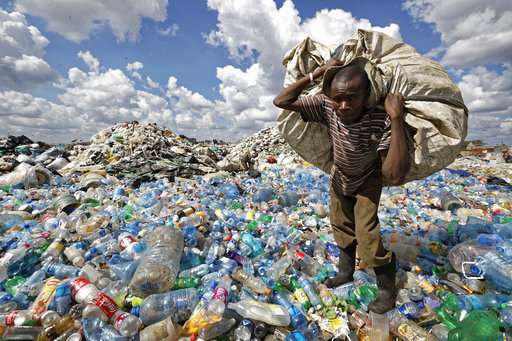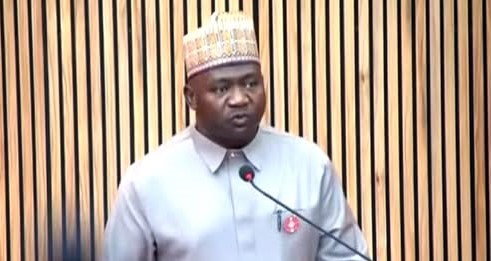It is with profound humility and a deep sense of responsibility that I address you today in my new capacity as the Minister of Defence of the Federal Republic of Nigeria. Six weeks ago, I was in Kaki. Now, I am coming as the Minister. It can only be God. I thank President Bola Ahmed Tinubu, GCFR, for the trust and confidence you have shown in me.
I take that very seriously. For me, it is indeed a privilege and an honour, after serving 39 years in service, to come in and now be the Minister of Defence of the Federal Republic of Nigeria. The love Nigerians have shown us reflects that people believe we can turn the tide.
But it is not rhetoric. It is by action. We must, firstly as Nigerians, take ownership of the responsibilities and challenges we face in our country.
It is only us who can solve the problem. It is when we agree within ourselves that we can deal with this, that we will succeed. God is with us, and He has always given us the responsibility to succeed.
This responsibility is one I accept with solemn reverence and unwavering commitment to the safety and security of our great nation, Nigeria. Let me also acknowledge the dedicated leadership of my predecessor and the relentless efforts of every one of you in this room.
When I was the Chief of Defence Staff, you gave me all the support, and I truly appreciate it. I want to assure you that coming back as Minister, we want to do more for your welfare, well-being, and the administration of the Ministry. I strongly believe in reward and accountability. You do well, you are rewarded. We take corrective measures to ensure we succeed. I don’t believe in “na so we dey do am.”
We must assess everything that we are doing and see whether we can improve it. I believe in fostering a positive workforce. We are going to listen to your challenges, and whatever we can do to address them, we will. But I count on you also to put in your best. You know your task ahead. You don’t have to wait until somebody calls you or asks you a question. Do what you are supposed to do, and that will make it easier for us as a nation.
The task of securing the nation is continuous, and I am aware that you have been holding the line with dedication. I commend you all. For decades, my life has been defined by uniform, by the ethos of service, and by sacred covenants to defend the territorial integrity and citizens of Nigeria. I therefore come to this role not as a stranger to our security challenges, but as a comrade who has been in the trenches both literally and figuratively. I’ve seen firsthand the bravery of our troops, the complexity of our threats, and the role of strategic coordination. Like I always say, no single individual can achieve this alone. No single service operator can do it. We must work as Nigerians, making Nigeria better.
Consequently, my core philosophy in ensuring the affairs of this ministry is simple: operational effectiveness through unified action and strategic foresight. Ladies and gentlemen, we cannot afford to operate in silos.
We cannot tolerate gaps between policy and execution, or between the ministry and the services. This ministry will be a powerhouse of strategic direction, enabling support, and relentless accountability. We must provide that support for our troops to continue to succeed. They are sacrificing their lives out there in the field—day and night, thunderstorm or windstorm—whatever the situation, to ensure that we, Nigerians, can go to bed and sleep well. We must continue to pray for them. We must continue to provide the necessary support.
Working as a team with other MDAs, Mr. President has made it very clear he will give us all the support we require and demands that we achieve success, which we have promised him. Within the first few weeks, we must show that we are committed: the ministry working inside, the troops working outside.
To translate this philosophy into action, my initial focus will rest on three interconnected pillars: enhancing joint operational strategy synergy. We will immediately begin a rigorous review of all theatre commands and inter-service operations. My door will be open, as always, to the Chief of Defence Staff and Service Chiefs for frank discussions on equipment, training, welfare, and strategy. Mr. President wants us to present our challenges, with the promise that they will be addressed. So it is left for us to do the needful.
Our goal is to overwhelm the adversaries with seamless jointness, not just cognition.
Welfare and Morale as a Force Multiplier
We all understand the importance of morale to our personnel and staff. We must therefore prioritise the timely provision of all necessary kits, ensure prompt payment of operational allowances, and vigorously address accommodation and medical care for our personnel and their families. Those not injured are watching how we treat the injured. If they are not taken care of properly, they will not give their best, because they will be apprehensive. Especially those who have lost their loved ones—the families want to know what will happen.
It is our responsibility to take care of them. The aspect of actions that impugn their integrity is not acceptable. We must make payments seamless. We must treat them with respect. Anybody who is laying down their life for their country deserves the highest respect, and that is what we offer. I will be very critical about that.
Intelligence-Driven and Technology-Enabled Defence
The Ministry of Defence is the strategic brain of our national defence architecture. We must therefore leverage technology for intelligence, surveillance, and recurring service. We have partners and allies ready to support us. We will reach out to them to work as a team. We will also collaborate with other security agencies. Every Nigerian is vital to the success of Nigeria. We will foster a culture where data and intelligence drive our decisions, not just experience alone. I charge the Ministry to be a catalyst for innovation and efficient resource management.
Distinguished ladies and gentlemen, I expect the highest standards of professionalism, integrity, and urgency from all of us. We do not have time to waste. We will continue to hit the ground running. We must respect the human rights of Nigerians. If we make mistakes, we must take necessary action to make amends. I will always encourage candid advice and robust debates. But once a decision is taken, we must move as one united team.
There will be zero tolerance for corruption, indiscipline, or indolence. Our loyalty is to Nigeria and the Nigerian people. The President is the Commander-in-Chief; the bulk stops on his table. We must provide the support required to make Nigeria peaceful.
Shedding of innocent blood is over. Our children should go back to school. Our farmers should go back to their farms. Most of the challenges we face are not military solutions—they are issues of good governance, justice, equity, and fairness, which we will encourage. Both non-kinetic and kinetic solutions must work hand in hand. We cannot afford to fail Nigerians. Charity begins at home; if we have the mindset that we will succeed, we will.
To the Service Chiefs, I offer my full support and expect your utmost cooperation to move the Armed Forces to greater heights. To the Department Secretary and the Civil Service cadre, you are the institutional memory and the framework for our sustainability. I value your expertise and count on your diligence to translate our military objectives into actionable administrative and budgetary policies.
The road ahead is demanding and will be tough. Let us not take it for granted. But because we are Nigerians, we shall overcome. The threats we face are adaptive and complex, but I have absolute faith in the indomitable spirit of our Armed Forces and the capable minds within the Ministry. With the support and prayers we are receiving from all Nigerians, we cannot fail.
In closing, let me once again reaffirm my commitment to lead with fairness, firmness, and loyalty to our Constitution. The President is doing everything possible to ensure our success. We must play our part. The task ahead is enormous, but surmountable. We can win. We will win. The good people of Nigeria are looking up to us for results, and we must deliver immediately. I am not here to preside; I am here to lead, to walk, and to deliver alongside you. I cannot do it alone. I thank you all as I look forward to our detailed work and the tasks ahead.
God bless you all, and God bless the Federal Republic of Nigeria.
Thank you.
— General Christopher Gwabin Musa (Rtd)
Minister of Defence, Federal Republic of Nigeria

 World4 days ago
World4 days ago
 Featured3 days ago
Featured3 days ago
 USA6 days ago
USA6 days ago
 National5 days ago
National5 days ago
 Featured5 days ago
Featured5 days ago
 Opinion5 days ago
Opinion5 days ago
 Boss Of The Week3 days ago
Boss Of The Week3 days ago
 USA5 days ago
USA5 days ago
















